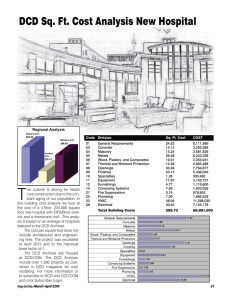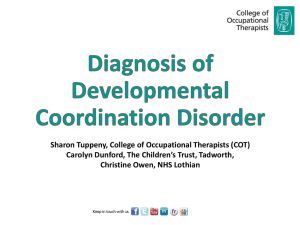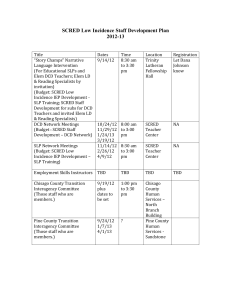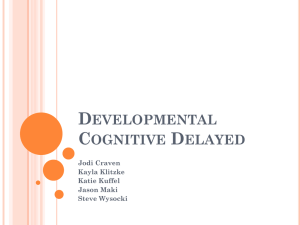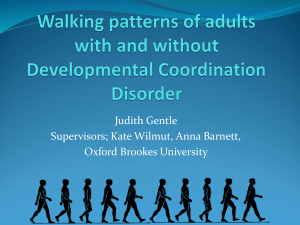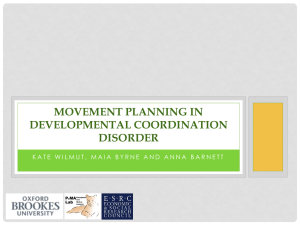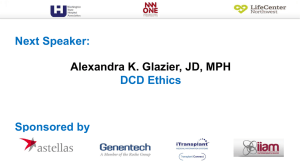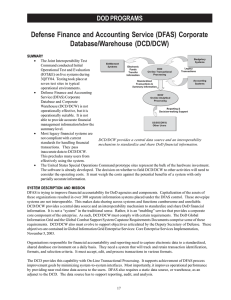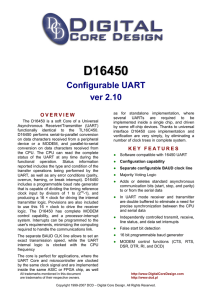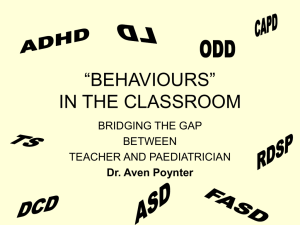What at the reported executive functioning skills deficits in students
advertisement
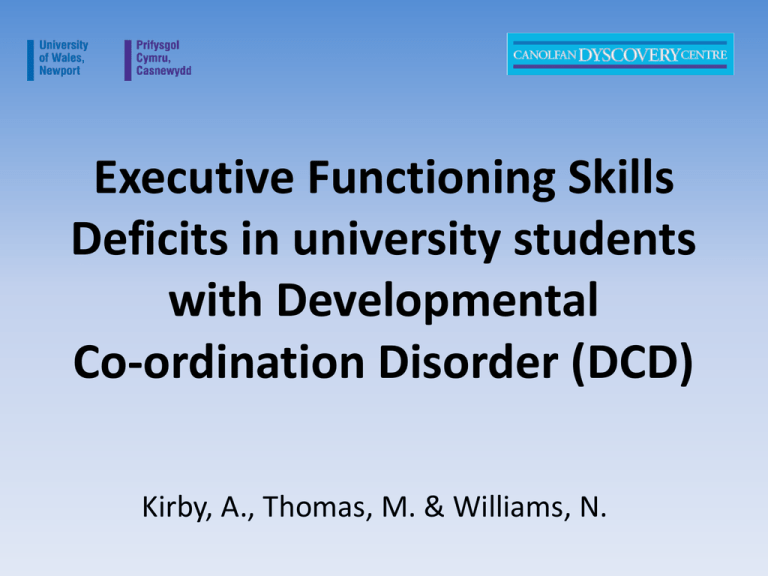
Executive Functioning Skills Deficits in university students with Developmental Co-ordination Disorder (DCD) Kirby, A., Thomas, M. & Williams, N. Background to the study • What is Executive Function (EF)? • EF in relation to DCD What is Executive Function (EF)? • Term used to describe a complex cognitive construct which allows us to act as efficiently as possible. • Components include: o Planning o Problem-solving o Working memory o Sustained attention o Impulse control o Decision-making EF processes can be split into actions that require: • conscious control (e.g. learning a new skill) • those that are automatic (e.g. memory recall) – or • a combination of both (e.g. riding a bicycle). Executive Function (EF) EF processes are associated with the prefrontal cortex (PFC) and other areas…. EF is not a unitary concept Different constructs have been made each with a different focus (Alloway, 2007; Gathercole et al. 2008). Different approaches to assessment of EF – Brown review (2009). He suggests clinical interviews and rating scales may be valid assessments. Impact of Executive Function Deficits Impairments or deficits in the system will impact greatly on a person’s ability to conduct day to day tasks and maintain social relationships (Goel et al., 1997; Green et al., 2000). EF is a predictor of future social competence (Nigg et al,1999; Clark et al., 2002). ADHD and poor EF- affect academic achievement (Biederman et al., 2004). EFDs have been identified in a number of Developmental Disorders • ADHD (Barkley, 1997; Biederman et al., 2007; Brown, 2009; Parker & Boutelle, 2009) • ASD (Verté et al., 2005) • Dyslexia (Reiter et al., 2005; Gooch et al., 2011) EF & DCD • Alloway (2007), Alloway & Temple (2007) – significant deficits in working memory in children with DCD. • Kirby et al. (2008) – self reported executive functioning deficits in students with DCD (and to a greater extent than those with dyslexia). • Kirby et al. (2011) – a high proportion of parents of emerging adults with DCD report problems with organisation, time & money management. Rationale for the exploratory study 1) Students arrive with/without diagnosis of DCD or an inaccurate diagnosis e.g. Dyslexia. However, support is often variable and determined by a “label” (Kirby et al., 2008). 2) DCD is a heterogeneous condition. Severity is on a continuum and will vary. 3) To understand support needs in relationship to EF it is useful to map out the profile of symptoms and signs. Study Aims 1. To investigate and compare patterns of self reported executive function skills in: a) students with DCD. b) students who do not have a diagnosis but reported difficulties. c) TD students. 2. Develop a functional tool to be used to assist planning and delivery of support. Method • Developed a 77-item questionnaire including different aspects of EF in the context of university, home and work life. • Paper and electronic version of questionnaire. • Each item scored on a 5 point Likert scale ranging from “Not at all like me” to “Very much like me”. 6 components Planning - “I always write essay plans before starting an assignment” Organisation - “I am good at organising lecture notes” Inhibition/impulse control - “I am easily distracted by other people or noise around me when writing assignments” Working memory - “When writing an assignment I often lose my flow of thought” Metacognition - “I find it hard to use feedback/ comments from previous assignments to improve work” Time management - “I am good at estimating how long it will take to complete different assignments” Recruitment Students currently attending university The study was advertised o Posters/bulletins around the universities/ student services o Social networking sites o The Dyscovery Centre website and database o DANDA members Data Gender No Diagnosis (TD) DCD No diagnosis but difficulties Total Male 122 12 12 146 Female 81 19 42 142 Total 205 31 54 290 Age range 18-64 years. Mean 26.78 (9.51) years Approach to analysis • TD group scores for each of the 6 components of EF were used as the comparison group. Examined how many of: a) the DCD group b) “no diagnosis but difficulties group” fell below the cut offs for the bottom 15th, 10th and 5th percentile based on the TD group. % Number of students with DCD who fell into the lower percentile cut off ranges based on the typically developing scores 100 90 80 70 60 50 40 30 20 10 0 15% or below 10% or below 5% or below No diagnosis but difficulties – a sub threshold group? 100 90 80 70 % 60 50 40 15% or below 30 10% or below 20 5% or below 10 0 Conclusions 1. Significant self-reported EF difficulties in those with DCD 2. ALSO those who do not have a diagnosis BUT say they have difficulties DO have greater EF difficulties than TD’s. Conclusions • Sub-threshold students at risk of failure and not being able to access same supports – due to not having a diagnosis. • Differential support systemwith a bias for those with Dyslexia (Kirby et al., 2008) Implications for universities support services • Screening/check list could o Delineate patterns where support could be offered o Provide tailored support o Identify the sub threshold student Future work • Further development of questionnaire o Refine questionnaire o Collect more data o Validate against other measures Executive Functioning Skills Deficits in university students with Developmental Co-ordination Disorder (DCD) Natalie Williams For further information please contact: Email: dyscoverycentre @newport.ac.uk Tel: 01633 432330
